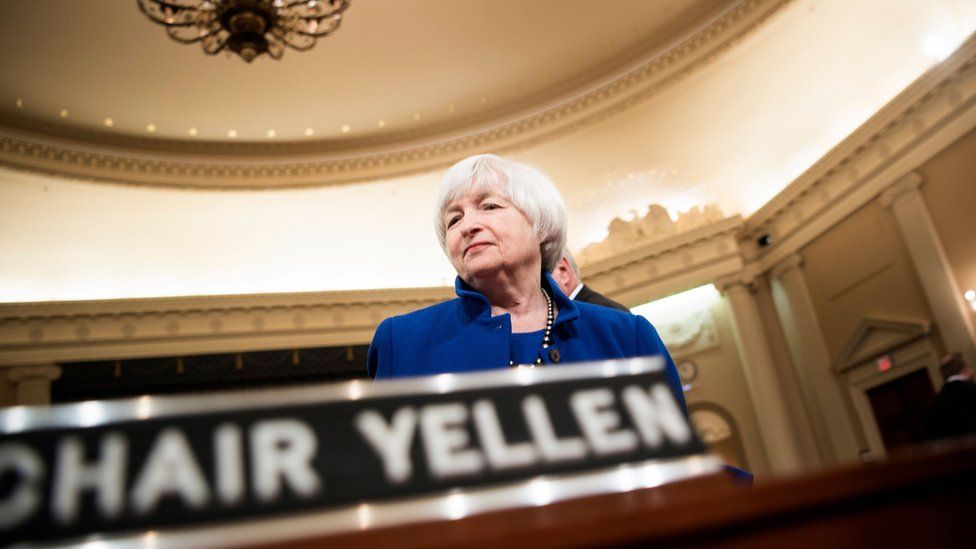US Federal Reserve raises interest rates again
- Published

The US Federal Reserve has raised interest rates by 0.25%, the third rate rise in 2017.
The US central bank said the move, which was widely expected, underscores "solid" gains in the US economy.
Officials also boosted their economic forecasts, projecting 2.5% growth in GDP in 2017 and 2018, due in part to planned tax cuts.
The Fed said it anticipates three further increases in rates next year, unchanged from its previous forecast.
The decision to raise interest rates, raising the cost of borrowing, takes the Fed farther away from the ultra-low rates it put in place during the financial crisis to boost economic activity.
Sounder sleep
The Fed is targeting a range of 1.25% to 1.5% for its benchmark rate. But a majority of officials said they expect interest rates above 2% will be appropriate next year.
The shift in policy comes as the US economy gains strength.
US economic output has increased at an annual rate of more than 3% in recent quarters, while the unemployment rate fell to 4.1% last month - the lowest rate since 2001.
Federal Reserve Chair Janet Yellen, who is stepping down from her post in February, said the economy, labour market and financial system have grown stronger under her watch.
"There's less to lose sleep about now than has been true for quite some time, so I feel good about the economic outlook," she said.
Tax cut impact
Ms Yellen said policymakers expect the economy to get a further lift from a package of tax cuts - one of President Trump's central campaign promises - and those expectations were factored in when they revised upwards their predictions for economic growth.
The Fed is now forecasting 2.5% GDP growth in 2018, compared to a forecast it made in September of 2.1%.
Analysis: Andrew Walker, BBC World Service Economics Correspondent
While Congress and President Trump's Administration continue to wrangle over tax reform, the Fed had to judge what the final outcome of that political process would mean for the economy. Inevitably there is a lot of uncertainty in there but they have concluded that it would provide a boost over the next three years.
The Fed's policy makers expect somewhat stronger growth than they did in September. Janet Yellen said that reflected a view in the committee that the reforms would stimulate consumer spending and business investment.
But there has not been much change in what the Fed's policy makers think of the longer term prospects. The Fed publishes information showing the range of expectations that its policy makers have. The middle of that range for long term growth is unchanged at a rather modest 1.8%.
Despite the acceleration in growth, members of the Federal Open Markets Committee said they expect interest rate increases to remain gradual - in part, a sign of ongoing concerns that inflation has remained below the Fed's 2% target.
Ms Yellen said she continues to believe the lacklustre inflation growth is due to one-off factors, such as declines in costs for mobile phone plans.
But she said the Fed will continue to watch those numbers and "if necessary, re-think" what is determining them.
"There's work undone there," she said.
- Published8 December 2017
- Published1 December 2017
- Published11 December 2017